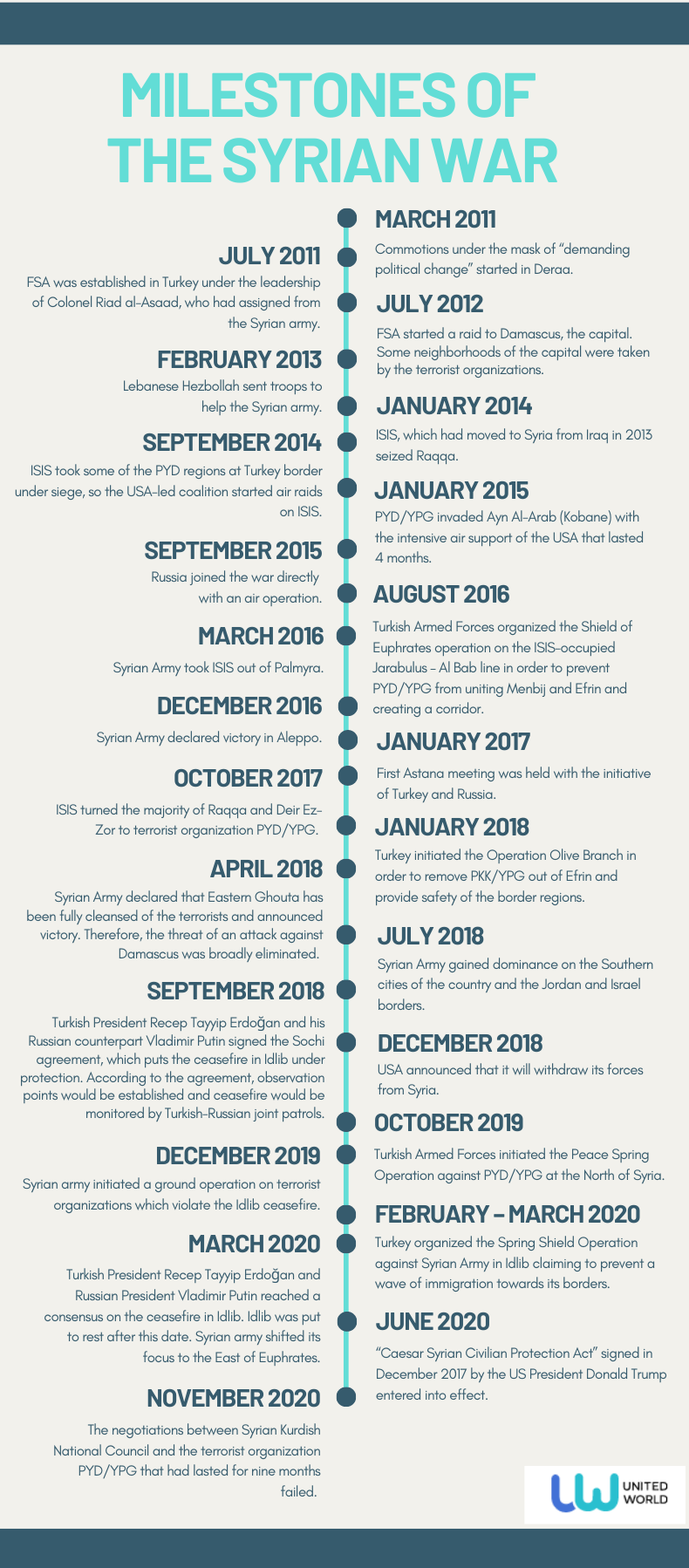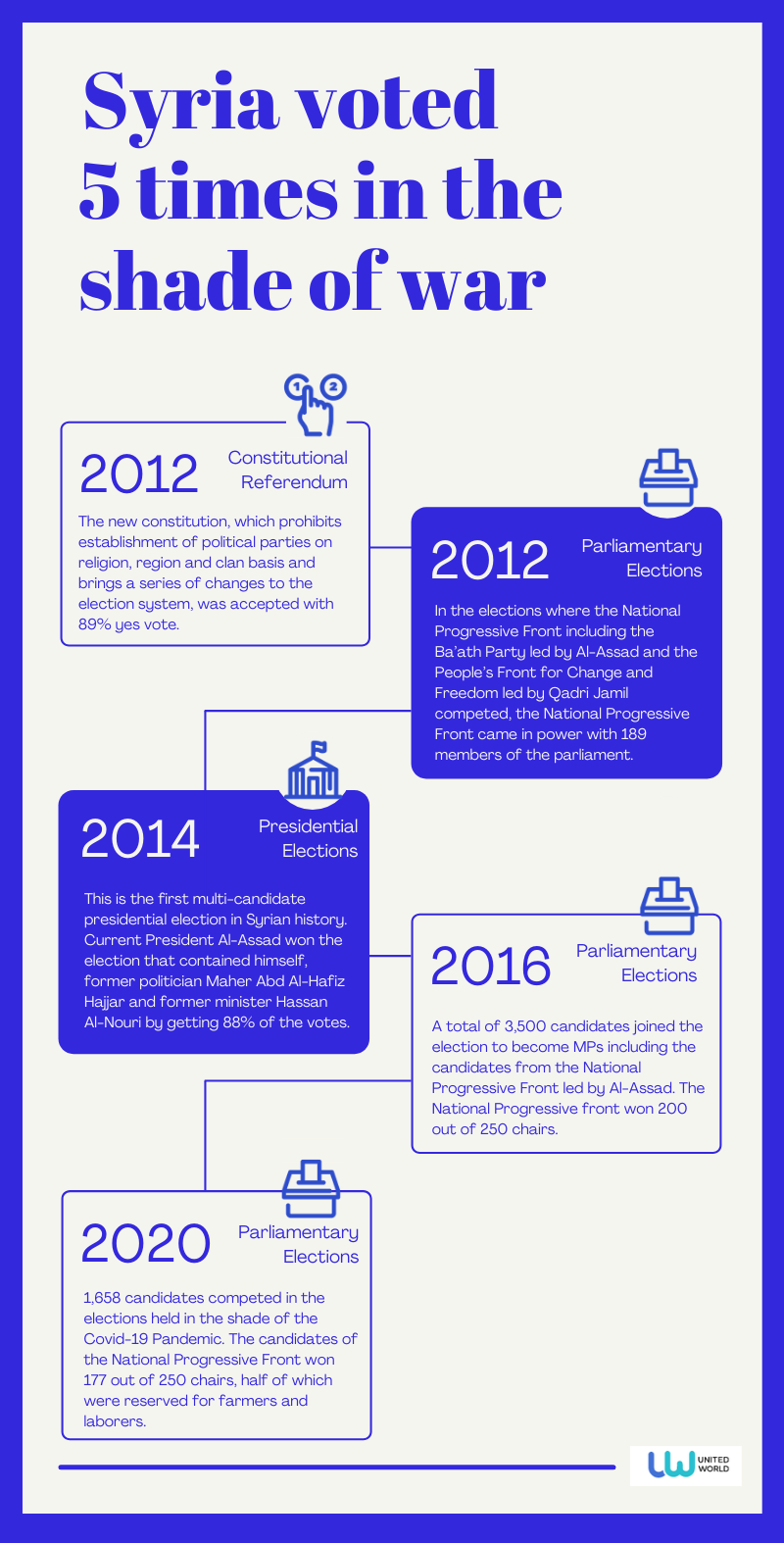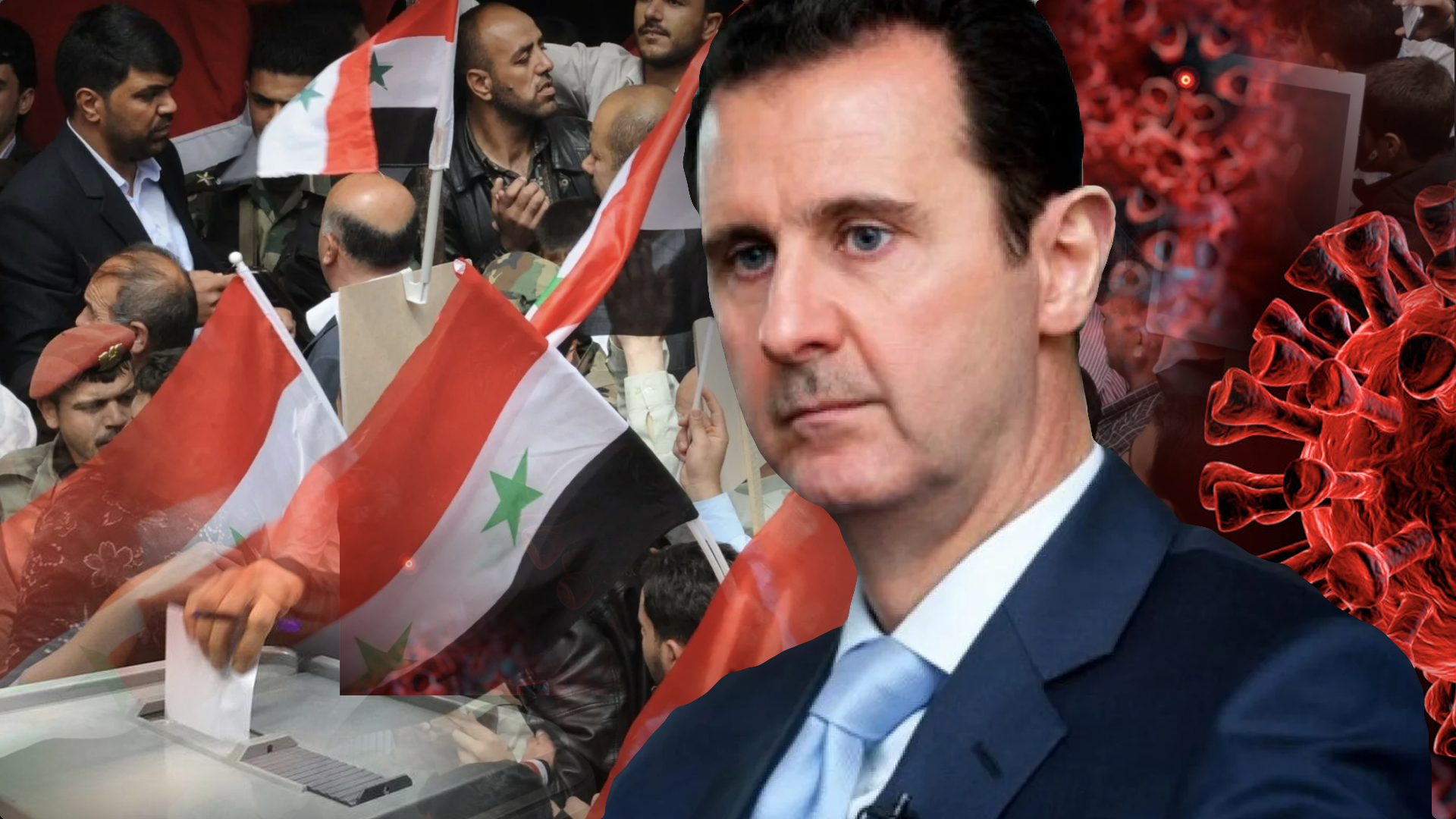By Cansu Yiğit
The Syrian army has rescued a major part of the country thanks to the great resistance of the Syrian people and their government. Preparing to elect its President on 26th of May, Syria has been dealt the most powerful cards in the international arena since 2011.
However, both the economic crisis aggravated by the sanctions and the de facto divided political structure are major challenges in front of Damascus.
On the 10th year of imperialist intervention in Syria, the Syrians will elect their President on 26th of May, 2021.
Syria drifted into a chaos by the acts of Western imperialist countries and funding and provocation of some regional countries. Nearly 500 thousand people have lost their lives in the 10 year-long war. 6.7 million Syrians had to flee withing Syria, while a further 5.6 million have fled the country. Out of these 5.6 million, 3.6 million are in Turkey, 1 million are in Lebanon, 660 thousand are in Jordan, 250 thousand are in Iraq and 130 thousand are in Egypt.

The Syrian territories are de facto divided into three parts. The US, Turkey and France all maintain military bases, as well as there are Russian and Iranian troops invited by Damascus. The US and France have bases in Raqqa and Deir ez Zor regions which are controlled by PKK/YPG. Turkey has troops in Efrin, Tell Abiad and Ras al-Ayn in the north of the country as well as in Idlib, where the Free Syrian Army (FSA) and jihadist groups are located.
Even the minimal economic conditions for living are barely fulfilled in the country due to the US and EU sanctions. The Damascus government is also battling an economic crisis while trying to clear its land of terrorists.
Election with three candidates
Under these conditions, the country is preparing for elections. 51 candidates, 7 of which are women, applied as Presidential candidates. The Syrian Constitutional Court has declared that only 3 of these candidates have fulfilled the legal requirements. Applications of Abdallah Saloum Abdallah and Mahmoud Ahmed Marei were also accepted as well as the current President Bashar Al-Assad. Abdallah Saloum Abdallah was a Minister of State from 2016 to 2020 and the leader of an opposing party, Mahmoud Ahmed Marei had participated in Geneva talks under the surveillance of United Nations.
Syria had organized a multi-candidate election for the first time in 2014, where Bashar Al-Assad was re-elected by getting about 90 percent of the votes. Bashar Al-Assad had started serving as the Syrian President after his father, Hafez Al-Assad died in 2000. Syrian constitution states that the Presidents can be in office for a maximum of two terms consecutively. This will be the last term of Al-Assad, who is estimated to win the elections by the majority, in office unless the constitution is changed. The last elections for members of the parliament was held last year in Syria.
According to the constitution that was accepted with a referendum in 2012, the candidates have to have resided in Syria for at least 10 years without interruption to be a candidate for Presidential elections. Syrians who are residing out of the country can vote if they are registered with the related embassy. Ballot boxes for voting can only be placed in regions controlled by the Damascus administration. Therefore, citizens living in Idlib and the majority of the land occupied by PKK/YPG are not able to vote.
The US and the Atlantic Front are against elections
The US, France and the UK have declared that they will not accept the election results as soon as the date of elections in Syria was announced. US Ambassador to the UN, Linda Thomas Greenfield made a speech and said, “The failure to enact a new constitution is proof positive that the so-called election on May 26 will be a sham”. She also stated that steps must be taken to provide that Syrian refugees, those who were subject to internal displacement and the diaspora take their part in the elections. Greenfield said “Until then, we will not be fooled”.

The Foreign Affairs Ministers of the US, the UK, France and Germany have also made a joint statement and claimed that the Syrian people took to streets 10 years ago for legitimate requests but the Assad regime responded to these protests in appalling violence. The ministers defended that the Assad regime and the countries that back the regime are solely to blame for the war that is going on for 10 years. The statement read: “It is imperative the regime and its supporters engage seriously in the political process. The proposed Syrian Presidential election this year will neither be free nor fair, nor should it lead to any measure of international normalization with the Syrian regime. Any political process needs the participation of all Syrians, including the diaspora and the displaced, to enable all voices to be heard.”
Stephane Dujarric, the spokesperson for UN Secretary General – Antonio Guterres, also stated that the UN has reiterated that it is not involved in Syrian presidential election and that the elections must be free and fair, held under UN’s supervision.
Turkey made a similar statement. Ambassador Tanju Bilgiç, the spokesperson for Turkish Ministry of Foreign Affairs said, “The presidential elections announced by the Syrian regime to be held on 26 May 2021 are incompatible with the criteria of the road map put forward by the UNSC Resolution 2254. The elections, depriving almost 7 million Syrians in diaspora of the suffrage, which are far from being free and fair, cannot be considered as legitimate by the international community”.
Troublemakers claim to have the solution
All the objections from the West to the elections in Syria are based on two claims:
1- The “opposition”, located outside the country, for instance the Syrians who reside in other countries without being registered in Syrian Embassies, cannot vote.
2- Damascus imposes its own political agenda instead of focusing on the Geneva process under UN’s initiative.
The Atlantic Front imposes a solution under its rules on the table it has established, although being the number one reason of the crisis in Syria and being defeated in the field. They would like the UN to take the initiative in political solution, even though it has never found a permanent solution to any problems so far. Damascus is presented as the party that does not accept the political solution, despite the fact that it has participated in every effort of the UN and has agreed to each and every negotiation.
Cyprus, Nagorno-Karabakh, Libya… The Syrian government sees that all problems which are mishandled by the UN are being solved through regional initiatives and insists on implementing its solution despite its challenges. Therefore, the regime attaches great importance to continuation of political processes in the country.
There are major challenges and some advantages in the horizon for Syria, which is going to hold a vote for the fifth time in the last 10 years despite the objections from the West.
CHALLENGES
1) Economic Crisis
According to the data published by UN High Commission for Refugees, 80% of the Syrian public live below the poverty line. It is estimated that 13 million people are in need of humanitarian aid.
In 2019, the financial crisis which emerged in Lebanon, Syria’s door to the outside World, together with the civil commotions has also deeply shaken the Syrian economy. Syrian business people used to carry out their banking activities via Lebanon due to the sanctions of the US and EU. When Lebanese banks brought some restrictions on transactions with USD due to the crisis in their country, USD inflow to Syria nearly stopped. Syrian pound has declined sharply against USD. According to the data from June 2020, USD jumped from 50 SYP to 4,000 SYP. Country’s inflation has risen to the top.
Economic crisis has grown deeper with the effect of the Caesar Sanctions Act enacted by the US in June 2020.
The Caesar Civil Protection Act, signed into a law on June 17, 2020, is different from previous US sanctions applied since 2011: it targets the countries who help Damascus; namely Russia, Iran and China. It is set forth that the assets of the organizations which violate this act are frozen and they are not to be given US visa. The aim of the US is to cut the economic ties of Damascus with the outside world.
However, it has been proven over and over that the economic sanctions only hurt the people they claim to support, rather than harming the people they target.
Syrian regime took a serious of measures in hopes of patching the hole drilled by the economic crisis. The request for high taxes on the rich business people in the country has been the most debated of these measures.
2) Covid-19 Pandemic
Covid-19 pandemic has affected the daily life and economy in Syria seriously, as is the case all around the world. The Syrian Ministry of Health declared that the first coronavirus case in the country has been detected on March 22, 2020. Syria has declared that they have detected a total of 23,693 cases in total and 1,693 people have lost their lives until May 5, 2021. The total number of tests applied in the country is 103,566. Ahmed Abbas, manager of the Damascus Hospital stated that the rate of occupation in intensive care units has reached to 100% as of mid-March and the positive cases have increased by 200%.
There are no official numbers related to the regions not under the control of Damascus administration which are under the siege of PYD/YPG and the jihadist organizations.
Syria was taken into the context of Covid-19 Vaccines Global Access Program (COVAX) of World Health Organization, which aims to provide equal access of low and middle income countries, and 203,000 thousand doses of vaccine was sent to Syria. WHO Syria Representative Dr. Akjemal Magtymova stated that they aim to send a total of 912,000 doses of vaccine to Syria for the government-controlled regions. Chinese government also donated 150,000 doses of Sinopharm vaccine.
3) Country de facto divided into three parts
Syria had to withdraw from four fifths of the country from the beginning of the war in 2011 to 2015. After this year, Syria began to reclaim its land step by step. Today, half of the country’s total territory is under control of the Syrian army. Damascus controls the populated regions of the country as well as the metropoles, the Mediterranean coastline and the majority of the borders to Lebanon and Jordan. The M4 highway which passes through Aleppo, Hama, Homs, Damascus and Daraa and Latakia and Tartus on the Mediterranean coastline, which are reached from Aleppo via M5 highway, are under the control of the Syrian army.
Although the Syrian army has managed to reunite most of the country’s land in as short as 6 years, it failed to seize control of the East of Euphrates and Idlib, where Turkish and US troops are located.
The East of Euphrates is invaded by the US-backed PYD/YPG. USA has about 600 troops in 12 separate points. The terrorist organization controls the oil resources in the region under protection from the USA.
Turkey-backed opposition forces, Tahrir al-Sham and jihadist organizations like Turkistan Islamic Party are located at the North of Syria.
Although the Syrian army had set eyes on Idlib until the last year, it encountered resistance from Turkey due to the possible wave of migration that can be directed to the border. After Turkey withdrew from the observation points in the regions which entered under the Syrian army’s control, the Syrian army has shifted its attention to the regions under the siege of PKK/YPG. In East of Euphrates, where both the US-Russian troops and Syrian army and PKK/YPG come face to face frequently, clashes occur from time to time.
THE ADVANTAGES OF DAMASCUS
1. Increased international recognition
The Arab and Gulf Countries which had frozen their relations with Syria after the war started and had even provided weapons to terrorist organizations once the war started have started to build relations with the Syrian government again after the resistance of the Syrian people.
First step was made by the President of Sudan, Omar al-Bashir, who was later deposed in a coup d’état. Bashir visited Damascus in 2018 in order to “unite the front of the Arab countries”.
After this visit, the 22 members of the Arab League who had cancelled Syria’s membership in November 2011 started talking about Syria’s return to the league. The countries made declarations one by one and stated their hope to see Syria back in the league.
Consequently, the United Arab Emirates and Bahrain have reopened their embassies in Damascus.
Another interesting development happened in the beginning of May. The head of the Saudi Arabian Intelligence service, Halid el Humaidan met his counterpart Ali Memluk from Syria in Damascus. Saudi Arabia, which is one of the greatest supporters of the jihadist groups, had declared that they do not consider to open an embassy in Damascus until two years ago. After this meeting, the Arab press wrote that Saudi Arabia is planning to reopen the embassy.
Although Saudis aim to oppose to Turkish and Iranian impact, such normalization might provide a relief for the cornered Syria.
Qatar’s ambassador to Russia, Ahmed bin Nasser made a declaration in April and said, “In fact, Qatar thinks similar to Russia on Syria. We are collaborating with Russia to end the current status of Syria.” Qatar is known to frown upon Syria’s return to the Arab League. This statement has further empowered the possibility of Syria returning to the Arab League soon.
Italy, which was the first European country to reopen its Libya embassy after Qaddafi, is known to work towards reappointing and ambassador to Damascus. Even Turkey, who had shown the harshest opposition to the Syrian administration since 2011 has restarted its relations with Damascus, even though it is still on the intelligence level. If we also consider Russia and China, who have never cut ties with Syria, Syria has the strongest hand dealt since 2011.
2. Regions under control of Damascus are now safer
After Aleppo, the largest city of Syria was cleared of terrorists in 2016, Syrian army regaining control on the rural area to the South of Damascus and the region from the East of Homs to the Iraq and Jordan borders in 2017 and the victory of Eastern Ghouta in 2018 helped provision of the safety of regions under the control of Damascus.
Even though Damascus was never out of the Syrian Army’s control, it was within the fire range of the terrorist who were located in Eastern Ghouta, which was very close to Damascus. Life continued on a knife edge in Damascus, which was frequently shot from this region. Relieved by the rescue of Eastern Ghouta, the Syrian administration could then focus on the rural areas of Hama and Idlib. Syria has cleared the majority of the South of Idlib from terrorism and the highway connection between Aleppo and Damascus was re-established thanks to the “disarmament” of the M5 highway through the agreement between Syria, Turkey and Russia.
3. Conflicts between foreign forces and terrorists
The terrorist organizations and foreign forces in the country had targeted the Syrian regime as one united front when the war started in 2011. However, as Damascus resisted and the war prolonged, these groups had to face the conflicts of interest among them.
The jihadist terrorist organizations cornered in Idlib are in conflict with each other. While the large organizations swallow the smaller ones, even the biggest organizations are crumbled under the political pressure. Turkey’s military presence in the region has temporarily frozen the larger showdowns and clashes.
The greatest support of the terrorist organizations which are losing at the front are the military forces of the foreign countries. Seeing that they are doomed to an end as soon as these forces are withdrawn from the region, the terrorist organizations now have tied their hopes to a “political solution” rather than war.
The same situation is true for the foreign forces in the country. Turkey and the US, which seemed to be on the same front when the war started, have now nearly become enemies due to US military support to PYD/YPG. Even though it was making statements targeting Syrian regime when the war started, Turkey had to carry out military operations on terrorist organizations including PYD/YPG, which the US calls it its “ground force”.
The differences in the agendas and goals among organizations and foreign forces targeting Damascus now strengthen Syria both in the arena and in the negotiations .
















Leave a Reply